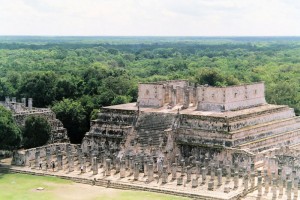 Plácido Domingo has certainly stirred things up. Last Saturday night, the man many hail as the world’s greatest living tenor staged the “Concert of 1000 Columns†at the great Maya site of Chichén Itzá in Mexico. Domingo, for those of you who are not opera fans, was born in Spain but grew up in Mexico, where he sang in a rock and roll band, played the piano for a ballet company, and made his stage debut in the late 1950s. Since then, Domingo has seldom looked back, performing in the world’s premier opera houses to rave reviews, recording more than 100 albums, starring in numerous opera films, and even playing a cameo part in The Simpsons.
Plácido Domingo has certainly stirred things up. Last Saturday night, the man many hail as the world’s greatest living tenor staged the “Concert of 1000 Columns†at the great Maya site of Chichén Itzá in Mexico. Domingo, for those of you who are not opera fans, was born in Spain but grew up in Mexico, where he sang in a rock and roll band, played the piano for a ballet company, and made his stage debut in the late 1950s. Since then, Domingo has seldom looked back, performing in the world’s premier opera houses to rave reviews, recording more than 100 albums, starring in numerous opera films, and even playing a cameo part in The Simpsons.
By all accounts, audience members at the “Concert of 1000 Columns,†who forked out as much as $900 for a ticket, lapped up Domingo’s performance. The great tenor reportedly turned on the charm, crooning a love song in Mayan and wooing devoted fans with several popular mariachi tunes.
But the performance left many Mexican archaeologists fuming. Mexican law, they pointed out, requires that Maya ruins be preserved to educate Mexicans about the ancient past: Domingo’s concert did nothing to illuminate Maya culture. Moreover, archaeologists worried that the construction of concert scaffolding would harm Chichén Itzá’s fragile stonework. In an effort at damage control, the Yucatan state government issued public assurances that all due precautions were taken to protect the site during the performance.
When I first read about the concert, I asked myself why Domingo was so keen to perform at Chichén Itzá. It’s difficult to believe that the site’s acoustics could rival those of his customary venues. So Chichén Itzá’s great appeal was clearly to provide a spectacular backdrop for the tenor—something that would convince fans to shell out big bucks for tickets and would attract major television interest. Can a “Live at the Concert of 1000 Columns†special or DVD be far off?
Domingo is not the only performer, however, who has been selling tickets and raking in the cash at a UNESCO World Heritage site. In 2004, Alicia Keyes, Cyndi Lauper and Boyz II Men performed a major concert at The Great Wall of China, claiming that the main message was “to promote peace.†Earlier on, both Sting and Pink Floyd played dates at the pyramids in Giza. And who can forget the performances of Verdi’s opera, Aida, at Giza in the 1990s? In addition to making money, they were staged to calm the fear of tourists after Islamic terrorists murdered 58 foreigners at Luxor. “Nothing can prove that this country is safe and stable better than a huge show like “Aida,” performed year after year in front of the most important tourist site in the world,†said Nazmi Amin, a top official of Egypt’s Tourist Authority, in an interview with the New York Times.
The truth is that we use our most important archaeological sites today for all sorts of reasons. But I wonder if it isn’t time for a little soul-searching about how we treat these cultural monuments. I personally believe the Mexican government had it right the first time. These sites are not backdrops or film sets, they are not concert halls or tourist ads, and they certainly aren’t profit centers. They are our fragile link with ancient civilizations. They deserve better.
This entry was posted by Heather Pringle on
Friday, October 10, 2008.
Discussion of this blog entry is now closed.
Comments posted here do not represent the views or policies of the Archaeological Institute of America.

